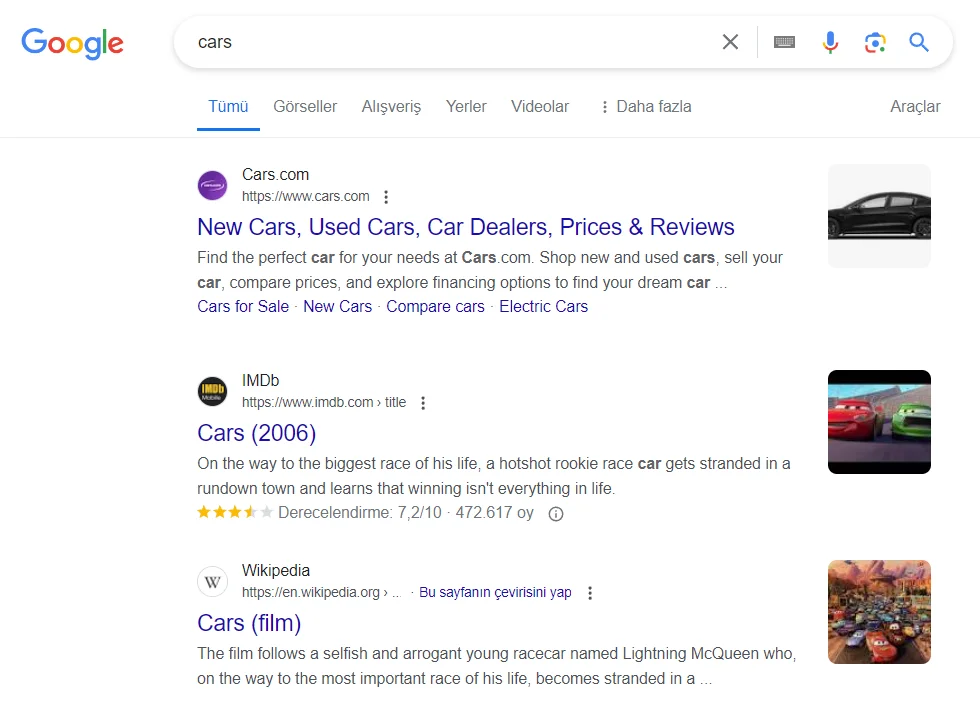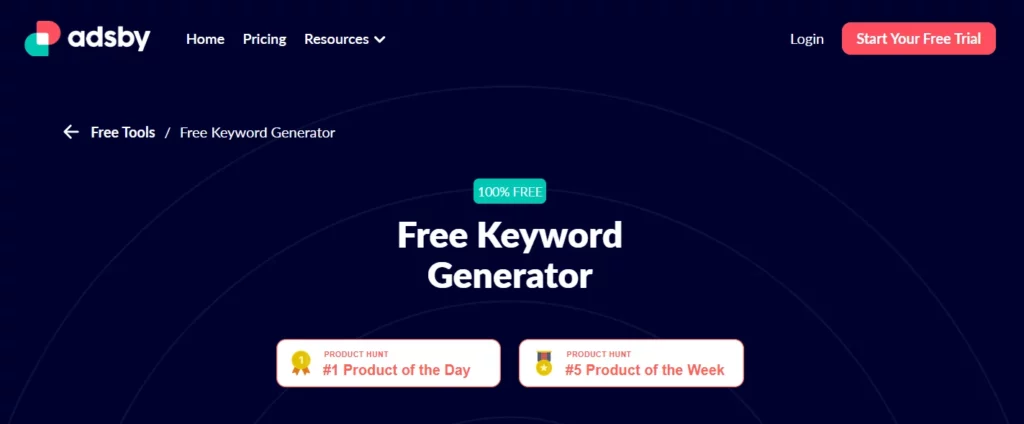
Stay ahead in SEO! Discover top keywords with a website keyword generator today.
In the competitive world of digital marketing, finding the right keywords is crucial for boosting organic traffic and improving SEO. A website keyword generator is a key tool that helps businesses discover the most effective keywords to enhance their search engine rankings.
So, how do we make better use of a website keyword generator? What are the importance, benefits, and best practices of a website keyword generator? Want to learn more?
Table of contents
What are Keywords?
Keywords are terms users enter into search engines to find relevant content. By incorporating these keywords into your content, search engines can rank your pages, making it easier for users to find you. Effective keyword research is essential for creating strong SEO and PPC strategies, helping your content align with user searches.
For example, if you search for “cars” the results will display a range of content related to that keyword:

Short-tail Keywords
They are short, general phrases like “shoes” or “marketing” that get a lot of searches. They can bring in a lot of traffic but are very competitive and hard to rank for. Short-tail keywords are useful for attracting a broad audience and increasing visibility. However, due to their high competition, they often require significant time and resources to rank well.
Advantages of Short-tail Keywords
- High search volume
- Broad audience reach
- Increased brand visibility
Disadvantages of Short-tail Keywords
- High competition
- Lower conversion rates
- Requires more effort and resources to rank
Long-tail Keywords
They are longer, more specific phrases like “running shoes for women” or “digital marketing agency in New York City.” They have fewer searches but less competition and often lead to higher conversion rates. Long-tail keywords are particularly effective for targeting niche markets and attracting highly interested and ready-to-convert users. They are easier to rank for and often result in higher engagement and conversion rates.
Advantages of Long-tail Keywords
- Lower competition
- Higher conversion rates
- Targeted and specific audience
Disadvantages of Long-tail Keywords
- Lower search volume
- Narrower audience reach
Functions and Benefits
- Short-tail Keywords
- Traffic Generation: Drive a large volume of traffic to your site.
- Brand Awareness: Increase the visibility and recognition of your brand.
- Long-tail Keywords:
- Targeted Traffic: Attract users who are specifically looking for what you offer.
- Higher Engagement: Users are more likely to engage and convert.
- Cost-Effective: Generally require less investment in SEO efforts to achieve high rankings.
What is a Website Keyword Generator?
A website keyword generator is a smart tool that finds important words to improve a website’s search engine optimization (SEO). By inputting url or a primary keyword or phrase, the generator analyzes vast databases to suggest related keywords, helping users optimize their content for better visibility and ranking on search engines like Google.
Using a website keyword generator offers several benefits. It saves time and effort by quickly providing a list of relevant keywords, allowing users to focus on creating high-quality content. These tools can identify keyword opportunities that might be missed by manual research, ensuring a comprehensive SEO strategy. Additionally, by targeting the right keywords, businesses can attract more qualified traffic, leading to higher engagement and conversion rates.
With advancements in AI technology, keyword generators have become more sophisticated. Modern tools utilize machine learning algorithms to understand search intent better and predict trends, offering more accurate and relevant keyword suggestions. AI-driven keyword generators can also analyze competitors’ strategies, providing insights into what keywords are driving traffic to similar websites. This enables users to stay ahead of the competition and continuously refine their SEO efforts for optimal results.
Why Important are Keywords for SEO?
In today’s digital world, having a strong online presence is vital for any business. Search Engine Optimization (SEO) helps make this possible, and keywords are a key part of SEO. Keywords connect what people are searching for with the content a business provides. By using keywords wisely, businesses can improve their search rankings, attract the right visitors, and turn them into customers. In this heading, we will discuss the importance of keywords for SEO; relevance, visibility, targeted traffic and competitive advantage.
1) Relevance
Keywords play a crucial role in SEO as they help search engines understand the content of web pages and match them with users’ search queries. By strategically incorporating relevant keywords into website content, meta tags, and other elements, businesses ensure that their content is aligned with what users are searching for. This alignment increases the chances that the content will be deemed relevant by search engines, thereby improving the website’s relevance in search results. When search engines find the content relevant, it’s more likely to be shown to users who are looking for specific information, products, or services, thus fulfilling user intent effectively.
2) Visibility
Incorporating relevant keywords throughout a website helps improve its visibility in search engine results pages (SERPs). When search engines crawl and index pages, they look for keywords to determine the topic and relevance of the content. By including these keywords in titles, meta descriptions, and throughout the content, businesses signal to search engines what their pages are about. Higher visibility in SERPs leads to more impressions, increasing the likelihood that users will click on the website. Essentially, keywords serve as a bridge between what users are searching for and the content a business provides, boosting its chances of being seen.
3) Targeted Traffic
Keywords drive targeted traffic to a website by attracting users who are actively searching for specific information, products, or services. This targeted traffic is more likely to convert into leads or sales because the users have a clear intent. For instance, a user searching for “best running shoes for marathons” is likely looking to make a purchase soon. By optimizing for such specific, high-intent keywords, businesses can attract visitors who are ready to engage or buy. This precision targeting makes keywords a powerful tool for converting traffic into tangible business outcomes.
4) Competitive Advantage
Effective keyword research gives businesses a competitive edge by uncovering opportunities that competitors may have missed. By identifying and targeting keywords that have high search volume but low competition, businesses can rank higher in SERPs more easily. Additionally, understanding the keywords competitors are targeting allows businesses to refine their strategies and create content that fills gaps or improves upon what is already available. This proactive approach ensures that a business can stay ahead in the competitive digital landscape, attracting more organic traffic and outperforming rivals.
Benefits of Using a Website Keyword Generator
1) Enhanced SEO Performance
By discovering targeted keywords, a keyword generator helps optimize your website content, improving search engine rankings and driving more organic traffic to your site. This means your pages are more likely to appear in search results when users look for related topics, increasing visibility and engagement.
2) Time-Saving Automation
Keyword research can be a time-consuming task. A keyword generator automates this process, quickly providing a list of relevant keywords. This efficiency allows you to focus on other critical aspects of your SEO strategy, saving hours of manual research.
3) Competitive Insights
A keyword generator can reveal which keywords your competitors are ranking for, offering valuable insights into their SEO strategies. By understanding what keywords are working for your competitors, you can tailor your content to compete more effectively, finding gaps and opportunities in the market.
4) Improved Content Planning
With a comprehensive list of relevant keywords, you can plan your content more strategically. A keyword generator helps identify topics that are in demand, guiding your content creation process to address the interests and needs of your target audience.
5) Increased Conversion Rates
By focusing on specific, long-tail keywords, you attract users who are more likely to be interested in your products or services. This targeted approach can lead to higher conversion rates, as the traffic you draw is more relevant and more likely to convert into customers.
6) Enhanced Ad Campaigns
For pay-per-click (PPC) advertising, a keyword generator can identify high-performing keywords, helping you create more effective ad campaigns. By targeting the right keywords, you can increase the return on investment (ROI) of your PPC efforts.
Integrating Keywords into Your Website
1) Optimizing On-Page SEO
Optimizing On-Page SEO means naturally integrating keywords throughout your website’s content in headers, body text, and image alt tags. This enhances search engine understanding and boosts rankings. But it’s crucial to maintain readability and user experience. Additionally, focus on optimizing meta tags, improving loading speed, and creating valuable content to resonate with your audience and drive organic traffic.
2) Creating High-Quality Blog Posts
Creating high-quality blog posts is crucial for attracting readers and boosting SEO. Follow these steps:
- Research your audience and keywords.
- Write relevant, engaging content.
- Use visuals and multimedia.
- Optimize for SEO with keywords and meta tags.
- Promote your posts widely.
- Monitor performance and iterate for improvement.
3) Enhancing Meta Tags and Descriptions
Optimizing meta tags and descriptions with relevant keywords is vital for SEO success. By aligning keywords with page content, you signal search engines, improving rankings and encouraging higher click-through rates. Crafting clear, compelling titles and descriptions is key. Regularly review and optimize to stay effective amidst evolving search algorithms and user behavior.
4) Using Keywords in URLs and Headings
Integrating keywords into your URLs and headings is essential for enhancing search engine visibility and delivering clear, relevant information to both users and search engines. By incorporating keywords in your URLs, you provide search engines with valuable context about the content of your web pages, making it easier for them to index and rank your site for relevant search queries. Similarly, using keywords in your headings, such as H1 and H2 tags, not only helps organize your content for readers but also reinforces the relevance of your pages to search engines. This strategic use of keywords in URLs and headings not only improves your site’s search engine ranking but also enhances user experience by providing easily navigable and informative content.
Adsby’s AI-Driven Tools: Free Keyword Generator

Try Adsby’s Free Keyword Generator to make your SEO better and more efficient. This tool helps businesses find the best keywords for their website keywords,Google Search Ads and other SEO task, making them work harder for you.
Conclusion
Utilizing a website keyword generator has the potential to greatly enhance your SEO endeavors. By grasping its functionalities, benefits, and best practices, you can strategically choose and incorporate keywords that not only attract traffic but also engage your audience and elevate your online visibility. With a good keyword generator, you can stay ahead in the competitive online world. So, dive in, explore its capabilities, and unlock the full potential of your website’s SEO with a reliable keyword generator.